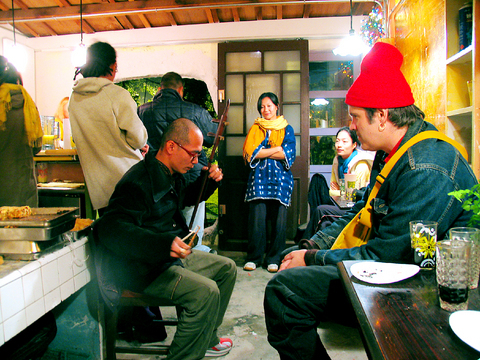The opening of a general store may not ordinarily warrant a mention in the newspaper, but the Treasure Hive, which opened its doors to the public at Treasure Hill last Sunday is part juice bar, part performance space, part soup kitchen, part grocery store, part local pub.
But it's mostly the latest chapter in the half-century saga that has seen Treasure Hill go from an anti-aircraft installation to an art installation.
"It's great to see somebody doing something here that is going to stay and to see this area revitalizing," said Yeh Wei-li (

PHOTO: DAVID MOMPHARD, TAIPEI TIMES
Treasure Hill got its start when the soldiers of the Chinese Nationalist Party (KMT) came to Taiwan.
The area was fortified and designed to protect the city's southwestern side from a Communist air attack. The soldiers stationed there built homes next to the guns they manned and married local girls.
By the time the guns were eventually removed, the area had become home and the soldiers stayed. Now there are ongoing plans to turn several of Treasure Hill's dilapidated structures into facilities that will host an artist-in-residence program.
Treasure Hive, located at the front of the community by a bicycle path that runs along much of the Danshui River, could be considered the first of the structures in the new artist community. Its proprietor, Mina Chin (覃敏怡), says she'll host weekly music performances on the lawn adjacent the store, will serve up a soup of the day, and plans to offer a variety of staple goods which she'll deliver to elderly locals.
The Treasure Hive is at 3, Alley 16, Ln 230, Dingzhou Rd, Sec. 3, Taipei (

Taiwan has next to no political engagement in Myanmar, either with the ruling military junta nor the dozens of armed groups who’ve in the last five years taken over around two-thirds of the nation’s territory in a sprawling, patchwork civil war. But early last month, the leader of one relatively minor Burmese revolutionary faction, General Nerdah Bomya, who is also an alleged war criminal, made a low key visit to Taipei, where he met with a member of President William Lai’s (賴清德) staff, a retired Taiwanese military official and several academics. “I feel like Taiwan is a good example of

March 2 to March 8 Gunfire rang out along the shore of the frontline island of Lieyu (烈嶼) on a foggy afternoon on March 7, 1987. By the time it was over, about 20 unarmed Vietnamese refugees — men, women, elderly and children — were dead. They were hastily buried, followed by decades of silence. Months later, opposition politicians and journalists tried to uncover what had happened, but conflicting accounts only deepened the confusion. One version suggested that government troops had mistakenly killed their own operatives attempting to return home from Vietnam. The military maintained that the

Before the last section of the round-the-island railway was electrified, one old blue train still chugged back and forth between Pingtung County’s Fangliao (枋寮) and Taitung (台東) stations once a day. It was so slow, was so hot (it had no air conditioning) and covered such a short distance, that the low fare still failed to attract many riders. This relic of the past was finally retired when the South Link Line was fully electrified on Dec. 23, 2020. A wave of nostalgia surrounded the termination of the Ordinary Train service, as these train carriages had been in use for decades

Lori Sepich smoked for years and sometimes skipped taking her blood pressure medicine. But she never thought she’d have a heart attack. The possibility “just wasn’t registering with me,” said the 64-year-old from Memphis, Tennessee, who suffered two of them 13 years apart. She’s far from alone. More than 60 million women in the US live with cardiovascular disease, which includes heart disease as well as stroke, heart failure and atrial fibrillation. And despite the myth that heart attacks mostly strike men, women are vulnerable too. Overall in the US, 1 in 5 women dies of cardiovascular disease each year, 37,000 of them